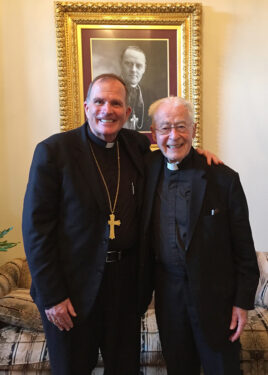
During this pandemic I have had an interesting but strange experience of walking down memory lane. Some of the strolls have been completely voluntary, some have intruded time and time again uninvited and I have not been able to figure out why.
What I mean is events that happened when I was in high school or when I was a young parish priest or when I was a student in graduate school as a young priest keep recurring. Most are pleasant memories but not all. Some wonderful memories are related to my friendship with Father Gerard Sloyan whose death at the age of 100 on Feb. 23, 2020, I learned of recently.
I wonder how many readers of this column know who Father Sloyan was. If this column devoted to Father Sloyan was being read any time during the last half of the twentieth century, I know many Catholics active in Catholic education or in the liturgical movement would recognize Gerry’s name immediately. Father Sloyan entered my life, or rather I entered his life, during the most difficult year I have had in my 60 years as a priest, 1964-1965.
In the spring of 1964 Bishop Bryan J. Mcenteggart asked me to go to Catholic University in Washington to obtain a doctorate in philosophy so that I could be ready to teach in a four year college seminary, Cathedral College of the Immaculate Conception, which he was planning to build in Douglaston, Queens, and to open in the fall of 1967.Because my sister had just died leaving two small children and because I was worried about my parents, I asked the Bishop for some time to think over his invitation.
And it was an invitation, not a command. With guidance from my spiritual director I decided to accept the invitation. I may have been the first priest who was given the opportunity by the Bishop to decline the assignment to become a teacher rather than a parish priest. I spent one year at Catholic University receiving a master’s degree and then finished my studies for a doctorate at Marquette University in Milwaukee.
The year in Washington was the most difficult year of my priesthood. I was 30 years of age, had not done any philosophy in eight years and was in classes with students who were in their 20s, all of whom seemed to know more philosophy than I did. When a professor referred to philosophers such as Descartes, Berkeley, Hume and Kant, I thought he was referring to Notre Dame’s backfield! As a seminarian I had never written a term paper.
The first papers I wrote at Catholic University probably read like homilies! I had great difficulty seeing the importance of what I was being asked to study and was worried about my parents and my niece and nephew. Trying to adjust to my life as a graduate student, I recall walking around the campus late at night reciting the rosary, striving to be hope-filled.
In the midst of experiences of anxiety and depression, I met Gerry Sloyan and made him my regular confessor. Father Sloyan was an inspiration to me and to many at the University. One priest-professor in Father Sloyan’s Department told me that working with Gerry was like being with Christ. The Department of Religious Education of which Gerry was the Chairperson was one of the most popular departments at the University.
I am not sure whether Gerry’s doctorate was in education or theology, but I do know that a great deal of the theology he knew was due to private study. To some extent he was self-educated. When I would go to his room to celebrate the sacrament of reconciliation I would notice on his couch books lying opened. I presumed these were by theologians he was presently studying.
One time in Confession I mentioned to him what a difficult time I was having going back to philosophy, which I had not studied in eight years. He misunderstood me and thought I was indicating that I did not really wish to be a teacher. I remember he mentioned that the Church had too many priests teaching classes who did not wish to be teachers. That his apostolate as a teacher seemed so successful motivated me to try to become the best teacher I could.
The last time I saw Gerry was about three years ago at a dinner hosted by Commonweal Magazine. I think Gerry, in his mid-90s at that time, had come to the dinner in Manhattan by bus from Philadelphia. I wish I had the opportunity to speak with him and tell him what a wonderful influence he was in my life. I hope to express my gratitude the next time I celebrate the Eucharist.
Father Lauder is a philosophy professor at St. John’s University, Jamaica. He presents two 15-minute talks from his lecture series on the Catholic Novel, 10:30 a.m. Monday through Friday on NET-TV.
